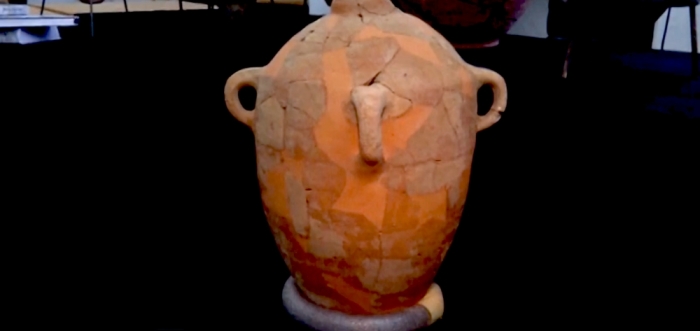Israeli Archaeologists Discover 3,000-Year-Old Jar With Inscription of Name From the Bible

Archaeologists in Israel have found a rare inscription of the name of an apparently influential person from the time of King David, a name that is also mentioned in the Bible, according to Israel Antiquities Authority.
Archaeologists have discovered a 3,000-year-old large ceramic jar with the inscription of the name "Eshbaal Ben Beda," The Associated Press reported Sunday.
The Old Testament book of 1 Chronicles in 8:33 and 9:39 identifies the fourth son of Saul as Eshbaal, also written as as Ish-bosheth. "Ner was the father of Kish, Kish the father of Saul, and Saul the father of Jonathan, Malki-Shua, Abinadab and Esh-Baal," the verses read.
However, archaeologists Yosef Garfinkel and Saar Ganor were quoted as saying that the jar belonged to a different Eshbaal, who was possibly the owner of an agricultural estate.
This is the first time the name was found in an ancient inscription, they said. It is one of only four inscriptions discovered from the biblical 10th century B.C. Kingdom of Judah under the reign of King David.
The discovery is significant, as it disproves claims that biblical accounts from the time of David and Saul are not verifiable and could just be myths.
The announcement about the discovery was made after archaeologists put together the inscription discovered on shards found in a 2012 excavation in central Israel. The examination was done at Institute of Archaeology at the Hebrew University in Jerusalem.
"We have found hundreds of jars in big cities across what was the Kingdom of Judah," Daily Mail quoted Ganor, the director of excavation at Khirbet Qeiyafa for the Israel Antiquities Authority, as saying. "This is the only one to have an inscription. For the jar to bear this man's name, it suggests he was someone very special and important. Writing from this period is extremely rare,"
"This is the first time that the name Eshba'al has appeared on an ancient inscription in the country," Garfinkel was quoted as saying. "It is interesting to note that the name Eshba'al appears in the Bible, and now also in the archaeological record, only during the reign of King David, in the first half of the tenth century BCE."
He added: "This name was not used later in the First Temple period. The correlation between the biblical tradition and the archaeological finds indicates this was a common name only during that period. The name Beda' is unique and does not occur in ancient inscriptions or in the biblical tradition."





























